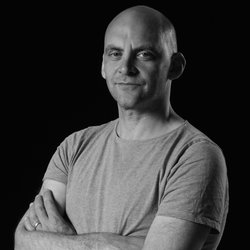Sean Holmes on the Secret Theatre tour
Lyric Hammersmith’s artistic director, Sean Holmes, talks about the creation of Secret Theatre and its upcoming tour
Lyric Hammersmith‘s immense success with its Secret Theatre project last year has led to Arts Council funding for a national tour. After another triumph at the Edinburgh Festival, Secret Theatre’s tour now takes in the West Yorkshire Playhouse (16 – 27 September) and Hull Truck Theatre (30 September – 4 October) – and we are very lucky in Yorkshire that we have a chance to see all six plays/events in the Secret Theatre repertory, five at Leeds and four at Hull, including Chamber Piece, Caroline Bird‘s black comedy and the only one omitted at the Playhouse.

© Joe Dilworth
Sean Holmes, artistic director of the Lyric Hammersmith, explained how the project came out, with both practical and artistic strands providing the impetus. Last year the Lyric started on a large-scale redevelopment which made it impossible to stage plays in the traditional way. Sean needed to find a way to stage, as he puts it, "theatre on a building site."
The artistic impetus derived from the production of Three Kingdoms two years ago. This was a joint production with the Munich Kammerspiele and Teater NO99 in Estonia, performed in all three countries, using all three languages and actors from all three companies. Sean Holmes was struck by the fact that the Lyric was the only theatre not to have a permanent company. While he is at pains to point out that other methods of making theatre are valid, he found the shared understanding and flexibility of approach of a permanent company appealing.
Initially Secret Theatre began with A Streetcar Named Desire and Woyzeck. Much was made at the time of the fact that the identity of the play performed on the night was not advertised in advance, but that is no longer part of the Secret Theatre policy; in fact Holmes claims that the "secret" was the hidden theatre. Now the "secret" is clearly a highly original approach to creating theatre, by no means just the idea of a permanent company which veteran repertory theatregoers will find familiar. Incidentally, with one exception (Show 6 by Mark Ravenhill, a three-hander), the same ten actors appear in each play.
A Streetcar Named Desire is the play with the most obvious popular appeal and, as such, gets no fewer than five performances at the Playhouse. It promises to be a striking production. Holmes points out cannily that, while we are happy to stage Shakespeare in somewhere/nowhere at different times, plays such as Streetcar, a 20th century classic, are always performed in the same style of poetic realism.
Not this time: there is no New Orleans, no jazz, there are no American accents. But it’s not transposed to a new scene: it simply takes place in a "space". Holmes is clear that it is true to Tennessee Williams‘ play; the spoken text is unaltered (except accents), even if stage directions are discarded. This is a production to "cut through received ideas and explore how great, modern and provocative a play this is."
Woyzeck, only to be seen at Leeds, is rather different. Georg Buchner‘s play is a flawed and fragmented masterpiece, so productions often use differing styles and even differing texts. Sean Holmes talks with relish about his first foray into the Secret Theatre as "full of three-chord punk energy". His Woyzeck is "short, sharp and black" – which sounds about right for Buchner’s expressionist tragedy – and it is short at about 70 minutes.
The other productions move further away from existing plays. Hayley Squires‘ Glitterland is based at a distance on John Webster‘s The White Devil, then there are the plays by Mark Ravenhill and Caroline Bird. Most striking of all is A Series of Increasingly Impossible Acts. At the beginning of the evening the name of one of the ten actors is drawn out of a hat. He or she becomes the protagonist who has to perform the increasingly impossible acts. The event is scripted, but clearly it changes with the protagonist and is also improvisatory. Sean Holmes tells me we learn a lot about the protagonist as actor and person – well, yes, and it’s something of a relief to find he thinks of it as "uplifting, heartwarming and joyful". Incidentally the commitment of the Secret Theatre company can be seen from the fact that only one member has left in over a year – and that an amicable departure caused by the actor’s work as a writer.
So, beyond doubt, an exciting and intriguing three weeks for Yorkshire theatregoers, but what next for the Secret Theatre company? Has the Lyric Hammersmith taken on board this exploratory style of production? Yes and no – when the theatre reopens in 2015, it will be with a traditional programme planned before Secret Theatre days, but the Hammersmith public can look forward to 2016 when the achievements and lessons of this project feed into the main programme.
The Secret Theatre is at the West Yorkshire Playhouse between 16 – 27 September before continuing the tour as below:
30 Sep – 4 Oct: Hull Truck Theatre
7 – 18 Oct: Arts Depot, North Finchley
1 Oct – 1 Nov: Manchester Royal Exchange
11- 22 Nov: Warwick Arts Centre












